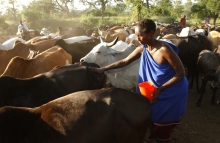 The Centre for Research on Multinational Corporations (SOMO), the Centre for Human Rights and Environment (CEDHA) and Cividep-India have released a guide for civil society organisations entitled ‘How to use the UN Guiding Principles on Business and Human Rights in company research and advocacy.’ The guide details the contents of the Guiding Principles and offers concrete guidance on how civil society organisations can use them to ensure businesses are respecting human rights.
The Centre for Research on Multinational Corporations (SOMO), the Centre for Human Rights and Environment (CEDHA) and Cividep-India have released a guide for civil society organisations entitled ‘How to use the UN Guiding Principles on Business and Human Rights in company research and advocacy.’ The guide details the contents of the Guiding Principles and offers concrete guidance on how civil society organisations can use them to ensure businesses are respecting human rights.
From the description, “these Guiding Principles can be utilised to address the responsibility of business to respect human rights and thereby support local communities, workers and other rights holders to ensure fulfilment of their human rights. The guide provides a method for CSOs to use the Guiding Principles in company research and advocacy, and helps them to hold companies accountable for their corporate responsibility to respect internationally recognised human rights.”



















